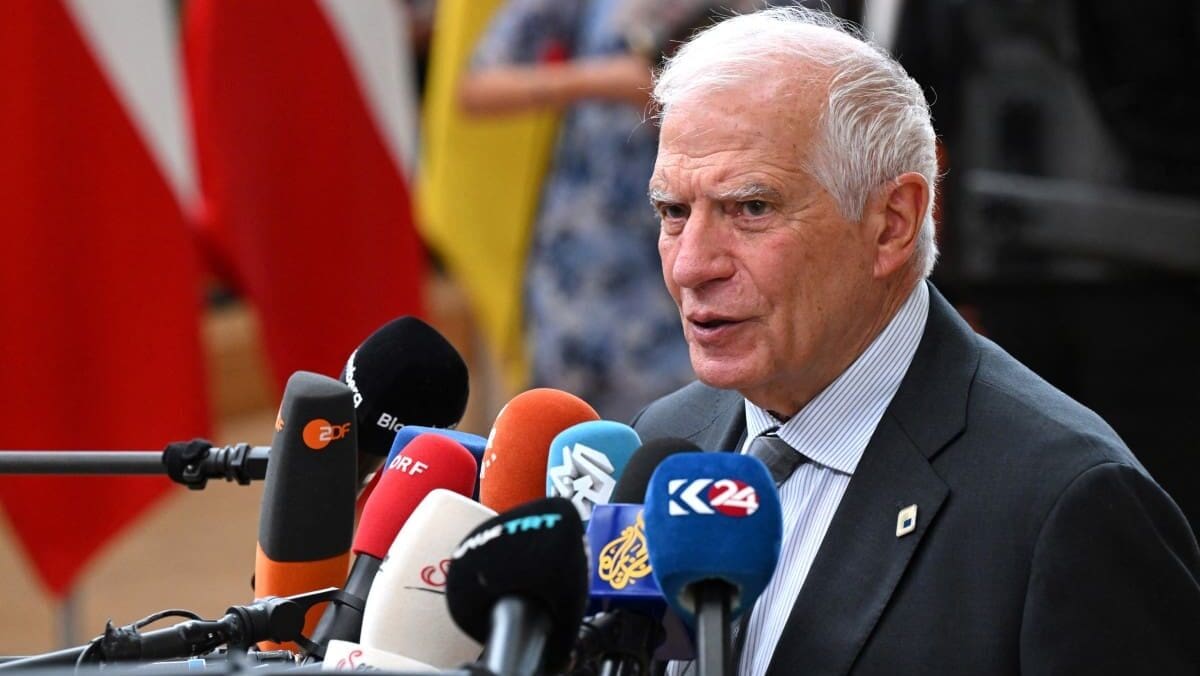
EU High Representative for Foreign Affairs Josep Borrell.
Photo: John Thys / AFP
Josep Borrell, the EU’s High Representative for Foreign Affairs, decided to move an informal ministerial meeting, initially planned by the EU Council’s Hungarian Presidency for the end of August in Budapest, to Brussels. Borrell intended to snub PM Viktor Orbán for his bilateral diplomatic efforts aimed at promoting his pro-ceasefire approach to end the war in Ukraine sooner.
The ‘non-boycott’ plan—which is not endorsed by the majority—however carries no real significance and only serves to highlight Brussels’ childishness once more, the Hungarian foreign minister commented.
Borrell’s initial plan was to call a formal ‘counter-meeting’ at the same time so that the EU foreign ministers would have no choice but to boycott the Budapest summit—one of the most influential events organized by Hungary during its six-month EU Council presidency term.
But the top diplomat was forced to abandon the ploy after he was rebuked by several member states who—even if they didn’t agree with Orbán’s approach to the war—believed boycotting the Hungarian presidency creates a counterproductive and harmful precedent for future EU cooperation.
For instance, Luxembourg’s Foreign Minister Xavier Bettel told reporters on Monday he would attend the informal meeting at the end of August, saying it was important to keep the dialogue with Budapest. Spanish Foreign Minister José Manuel Albares said “there can be no boycott within the European Union.” Slovenian Foreign Minister Tanja Fajon said Slovenia was not in favor either unless there was a collective EU decision. A week before, Austria’s Chancellor Nehammer was also quite clear when he said that not talking to each other is the “worst of all solutions.”
But with other countries (including heavyweights like France and Germany) still strongly demanding Hungary to be ‘punished’ for Orbán’s “peace mission” (or “appeasement mission,” as Ursula von der Leyen put it), the issue was brought up again during Monday’s foreign affairs council in Brussels.
According to sources close to Euractiv, 13 member states wanted the summit to take place in Budapest, and only five were firmly against the idea, threatening to boycott the event if it went as it was originally planned. Some even floated the idea that it should be moved to Kyiv in a more symbolic jab at Hungary, but the idea was quickly voted down. The remaining eight ministers said they’d leave it up to Borrell to decide.
And that he did, finding an in-between solution that’s not quite a boycott but still feels like taking the wind out of Orbán’s sails. “We have to send a signal, even if this is a symbolic signal,” Borrell said after the meeting when he announced changing the venue to Brussels. “But I refuse the word ‘boycotting,’ the meeting will take place, and Hungary will be there.”
But for Hungary, it feels like a victory. Regardless of the venue, the summit would have been chaired by Borrell (as foreign affairs is the sole portfolio that falls outside of the competence of the rotating Council presidency), and what is important is that all foreign ministers will be present.
“What a fantastic revenge they have come up with,” Szijjártó said jokingly after the meeting. “I don’t want to hurt anyone’s feelings, but it feels like being in a kindergarten.” The minister added that it makes no difference to him whether Borrell respects the tradition and calls the summit to Budapest “where we’ll welcome the ministers with our Hungarian hospitality” or changes it to Brussels, as the meeting will be virtually the same.
However, to give a bit more weight to his senseless plot, Borrell also floated that he might open legal proceedings against Budapest for not respecting the EU treaties that demand all members to support the bloc’s foreign policy with “loyalty” and “solidarity.”
“Each member state is sovereign on its foreign policy—true. But as far as they are members of this club, they have to obey the treaties,” Borrell said, refusing to openly accuse Orbán of a legal breach: “For me, it’s clear what has happened belongs to the realm of a lack of loyal cooperation.”
What Borrell forgets is that, per the same treaties, the EU only has an official foreign policy position if it is unanimous. And if there’s no unanimous position—only a majority one—then no one is obliged to support it.
“The EU is not in Brussels, the bureaucrats are there. The EU is Budapest, Warsaw, Paris, and Berlin. So if we, member states, all agree on certain subjects, then we have an EU position. If we don’t agree, there is no common position,” PM Orbán explained why it could not be said he was not ‘against’ an ‘EU position’ a few months ago—and the same applies here.
Besides, Orbán’s approach to the war—urging all parties to consider ceasefire negotiations—may be rebuked by all other member states except Slovakia, but it’s the most common position among the European voters, and it’s increasingly looking like it will be Kyiv’s as well in just a few months.
#EPCSummit in Blenheim.
— Orbán Viktor (@PM_ViktorOrban) July 18, 2024
Thousands and thousands are dying on the battlefield every day. We will find no #peace on the battlefield, but only at the negotiating table. My goal is to convince European leaders to make a shift to a pro-peace policy. pic.twitter.com/AG46FPCvmG
